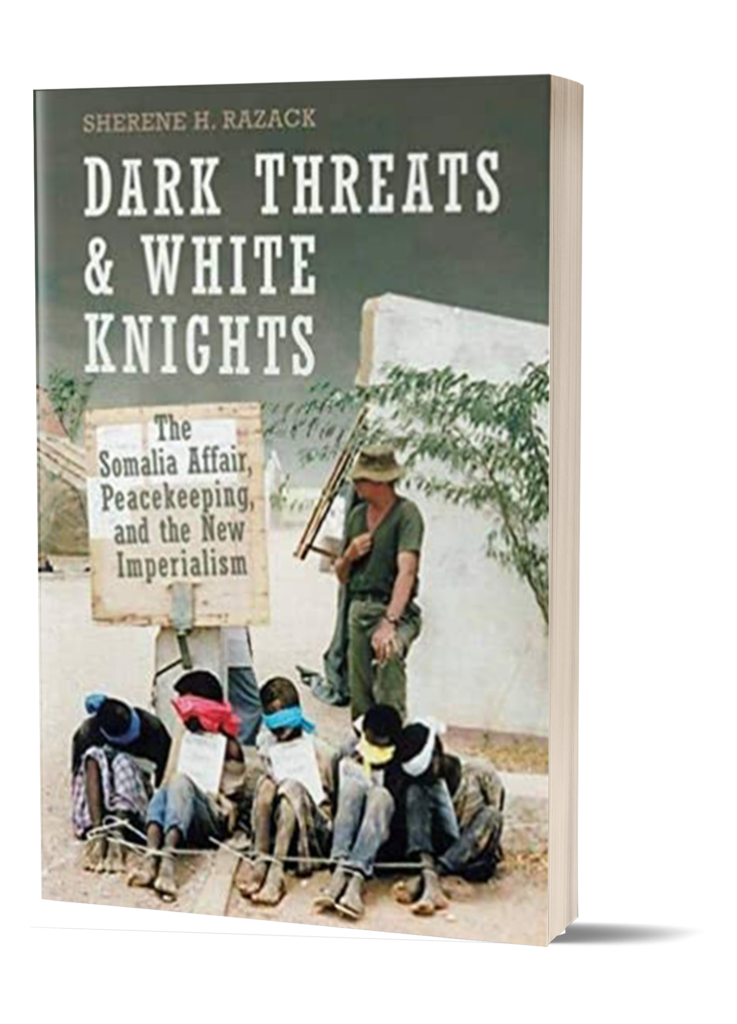- Home
- Publications
Dark Threats and White Knights: The Somalia Affair, Peacekeeping, and the New Imperialism (Heritage)
Published May 2004
Dark Threats and White Knights: The Somalia Affair, Peacekeeping, and the New Imperialism (Heritage)
Somalia. March 4, 1993. Two Somalis are shot in the back by Canadian peacekeepers, one fatally.
Barely two weeks later, sixteen-year-old Shidane Abukar Arone is tortured to death. Dozens of Canadian soldiers look on or know of the torture.
The first reports of what became known in Canada as the Somalia Affair challenged national claims to a special expertise in peacekeeping and to a society free of racism. Today, however, despite a national inquiry into the deployment of troops to Somalia, what most Canadians are likely to associate with peacekeeping is the nation’s glorious role as peacekeeper to the world. Moments of peacekeeping violence are attributed to a few bad apples, bad generals, and a rogue regiment.
In Dark Threats and White Knights, Sherene H. Razack explores the racism implicit in the Somalia Affair and what it has to do with modern peacekeeping. Examining the records of military trials and the public inquiry, Razack weaves together two threads: that of the violence itself and what would drive men to commit such atrocities, and secondly, the ways in which peacekeeping violence is largely forgiven and ultimately forgotten. Race disappears from public memory and what is installed in its place is a story about an innocent, morally superior middle-power nation obliged to discipline and sort out barbaric third world nations. Modern peacekeeping, Razack concludes, maintains a colour line between a family of white nations constructed as civilized and a third world constructed as a dark threat, a world in which violence is not only condoned but seen as necessary.

Praise
“In Dark Threats and White Knights, Sherene H. Razack raises issues that are central to world politics today – especially in light of Anglo-American occupation of postwar Iraq – covering a range of scholarly, journalistic, and governmental sources. The book is clearly and eloquently written. I found it a compelling read.”
L.H.M. Ling, International Affairs Program, New School University
“Based on a thorough inquiry into the Canadian intervention in Somalia, Sherene Razack’s book reveals the paradoxical relationships between international peacekeeping and racist violence, humanitarianism and imperialism, thus interrogating in a convincing and disquieting manner the new moral order of the world. A remarkable journey deep into the heart of whiteness.”
Didier Fassin, Centre de Recherche sur les Enjeux contemporains en Santé Publique, Université Paris 13-EHESS-Inserm
“With Dark Threats and White Knights, Sherene H. Razack has pulled back the curtain on a very distinctive form of national myth-making. This is a detailed case study of one country’s international peacekeeping gone awry that, at a deeper level, gives the reader a new understanding of contemporary forms of institutionalized racism.”
Cynthia Enloe, Department of Government and International Relations and Women’s Studies Program, Clark University
“Razack’s unflinching look at one of the least glorious episodes of Canadian military history proves that committed research can produce knowledge that may free us from repeating patterns leading to shameful consequences.”
Jean-Paul Brodeur, École de criminologie, Université de Montréal